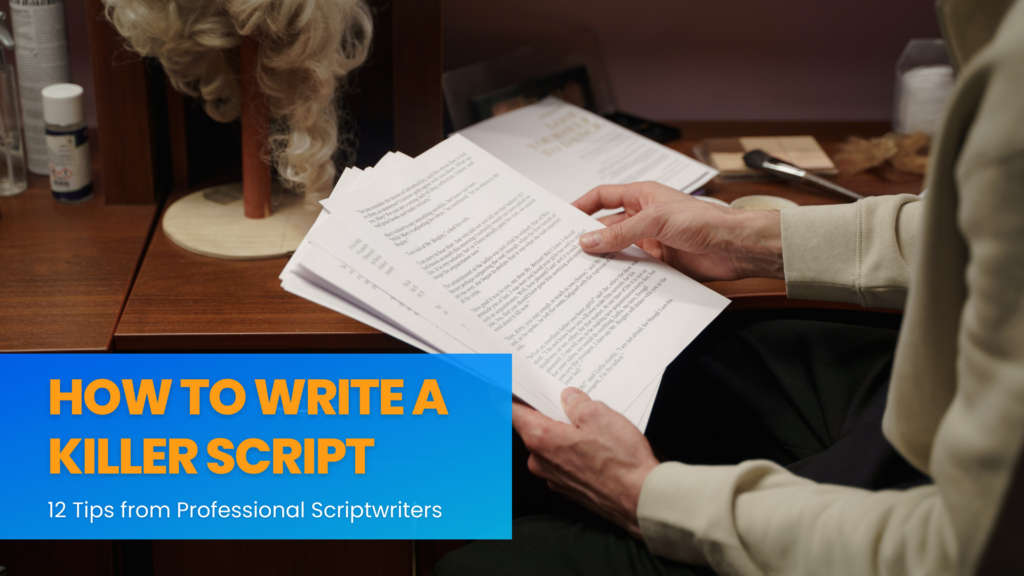As a Hollywood creative producer, I’ve learned that writing a killer script is not just about having a good story to tell. It’s about crafting that story in a way that engages and captivates your audience from beginning to end.
Through my years of experience, I’ve picked up several valuable tips that can help any writer create a screenplay that stands out from the crowd. In this article, I’ll be sharing some of these tips with you.
1. Improve Your Storytelling Prowess
The foundation of any good screenplay is a well-told story. Your story should have a clear beginning, middle, and end, with a well-defined protagonist and antagonist. Think about what makes your story unique and what themes you want to explore. Consider the emotional journey that your characters go through and how their actions and decisions affect the story. Think about the message you want to convey and how you can do so in a way that resonates with your audience.
2. Create Compelling Characters
Stories are lame without compelling characters. Characters are the heart and soul of any story. Without well-developed characters, your screenplay will fall flat. Your characters should have clear motivations, desires, and flaws that make them relatable to your audience. Take the time to flesh out your characters and make them feel like real people. Consider what your characters want, and what they’re willing to do to get it. Conflict arises from characters’ desires and motivations, so create strong characters with interesting personalities and flaws.
3. Know Your Script’s Genre
One of the most important things to keep in mind when writing a script is to understand the genre you’re working in. Whether it’s a thriller, a romantic comedy, or a sci-fi epic, each genre has its own conventions and rules. Familiarizing yourself with these conventions will help you structure your story and create characters that fit within the genre.
4. Craft a Strong Script Opening
The opening scene of your screenplay is your chance to grab your audience’s attention and set the tone for the rest of the story. Make sure your opening scene is engaging and sets up the conflict that will drive the story forward. Whether it’s an action-packed sequence or a quiet moment of introspection, your opening scene should be memorable and set the stage for what’s to come. A strong opening creates interest and raises questions that the audience wants to be answered.
5. Develop a Compelling Conflict in Your Script
Every good story needs a conflict. It’s what drives the plot and keeps your audience engaged. Your conflict should be strong enough to keep your audience invested in the story and should have high stakes for your characters. Whether it’s a personal struggle or an epic battle between good and evil, your conflict should be at the heart of your screenplay.
Your story should have a clear, strong goal that the protagonist is working towards, and a clear antagonist or opposing force that they must overcome.
6. Use Dialogue Wisely
Dialogue is an essential tool for conveying information and developing your character. However, too much dialogue can bog down your screenplay and make it feel heavy-handed. Use dialogue sparingly and make sure every line serves a purpose. Make sure your characters speak in a way that’s consistent with their personality and background. Consider the rhythm of the dialogue and how it reflects the tone and pace of the scene.
7. Pay Attention to Your Script’s Pacing
Pacing is essential for keeping your audience engaged. Make sure your story moves along at a brisk pace and doesn’t get bogged down in exposition. Use cliffhangers and plot twists to keep your audience on the edge of their seats. Your screenplay should be a page-turner that keeps your audience guessing until the very end. Be mindful of the length of your scenes, and vary the pacing to keep the audience engaged.
8. Keep It Visual
The film is a visual medium, so make sure your screenplay is full of vivid imagery and strong visual cues. Use descriptive language to paint a picture in your audience’s mind and create a world that feels real and immersive. Make sure your scenes are visually interesting and memorable. Use cinematic language to create a sense of movement and momentum, and to create a sense of place and atmosphere.
9. Edit Your Script Ruthlessly
No screenplay is perfect on the first draft. Take the time to read through your screenplay multiple times and make edits as needed. Cut out unnecessary scenes and dialogue, and tighten up the pacing. A well-edited screenplay will be much stronger than one that’s been rushed. Consider getting feedback from others, such as fellow writers, script consultants, or even potential audience members, to get a fresh perspective on your work.
10. Understand Script Structure
Every screenplay should have a clear structure that includes a beginning, middle, and end. The beginning sets up the characters and the conflict, the middle develops the conflict and raises the stakes, and the end resolves the conflict in a satisfying way. Understand the three-act structure, and how it can be used to structure your screenplay.
11. Read Scripts and Watch Movies
One of the best ways to improve your screenwriting skills is to read other scripts and watch movies. Analyze how the screenwriters developed their characters, built tension, and created a satisfying ending. Look for patterns in the structure, pacing, and dialogue. Pay attention to how the story is told visually, and how the script is translated to the screen.
12. Listen to Your Script
Sometimes, reading your screenplay multiple times can make it difficult to spot errors and inconsistencies. One solution to this is to listen to your script being read out loud. This will help you pick up on pacing issues, awkward phrasing, and other mistakes.
There are several free text-to-speech tools available that can read your screenplay back to you in a natural-sounding voice. Hearing your script out loud can also help you determine if your dialogue sounds realistic and if your characters’ voices are consistent throughout the story.
FAQs
Q: What is the most important thing to keep in mind when writing a script?
A: Understanding the genre you’re working in is crucial when writing a screenplay. Familiarizing yourself with the conventions of your chosen genre will help you structure your story and create characters that fit within the genre.
Q: How can I create compelling characters for my script?
A: Take the time to flesh out your characters and make them feel like real people with clear motivations, desires, and flaws. Consider what your characters want, and what they’re willing to do to get it. Conflict arises from characters’ desires and motivations, so create strong characters with interesting personalities and flaws.
Q: What should be included in the opening scene of a script?
A: The opening scenes of a screenplay should be engaging and set up the conflict that will drive the story forward. Whether it’s an action-packed sequence or a quiet moment of introspection, your opening scene should be memorable and set the stage for what’s to come.
Q: How can I improve the pacing of my script?
A: Varying the pacing of your screenplay to keep the audience engaged. Use cliffhangers and plot twists to keep the audience on the edge of their seats. Be mindful of the length of your scenes and use editing to tighten up the pacing.
Q: How can I edit my script effectively?
A: Reading through your screenplay multiple times and making edits as needed. Cut out unnecessary scenes and dialogue, and tighten up the pacing. Consider getting feedback from others, such as fellow writers, script consultants, or even potential audience members, to get a fresh perspective on your work.
Q: How can I improve my script writing skills?
A: Reading other scripts and watching movies to analyze how screenwriters develop their characters, build tension, and create a satisfying ending. Pay attention to how the story is told visually and how the script is translated to the screen. Additionally, using text-to-speech tools to listen to your script being read out loud can help you spot errors and inconsistencies.
The bottom line
Writing a killer screenplay is a challenging task that requires a lot of hard work and dedication. By following the tips mentioned above, you can improve your writing and create a screenplay that stands out from the crowd. Remember to know your genre, create compelling characters, craft a strong opening, develop a compelling conflict, use dialogue wisely, pay attention to pacing, keep it visual, edit ruthlessly, understand the structure, read scripts and watch movies, and listen to your script with text-to-speech tools.
But that’s not all! If you want to take your screenwriting skills to the next level, be sure to download our free writing tips guide. This guide provides even more detailed advice and techniques for crafting amazing screenplays. With our guide in hand, you’ll be well on your way to creating the next great blockbuster. So what are you waiting for? Click the link to download our writing tips guide and start writing amazing scripts for free!
Three Things you can do to keep fast track of your learning:
- Connect on Linkedin as I share valuable lessons weekly.
- Fast track your learning: Get the 6 Steps plus 15 years of Hollywood and Agency experience in one Workshop and masterclass.
- Use the template: 18 Scripts that Sell (also included in every Script-Timer plan)





